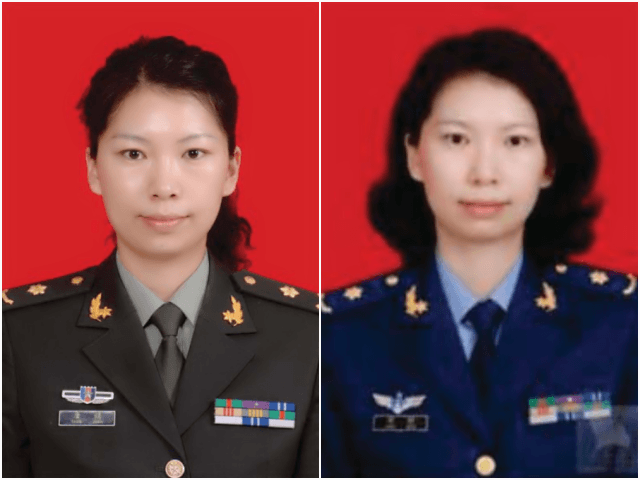John Binder
The Department of Justice (DOJ) has dropped charges against five members of the Chinese military whom federal prosecutors previously accused of lying to obtain visas to get jobs and a doctoral spot at United States universities.
Late last week, prosecutors wrote in a court brief that they would be dropping their criminal cases against China military members Juan Tang, Chen Song, Kaikai Zhao, and Guan Lei — all of whom had been accused of fraudulently obtaining visas to secure roles at U.S. universities in California and Indiana.
DOJ officials told the Wall Street Journal that the department dropped the visa fraud charges after a re-review of the cases and justified the move, saying the Chinese nationals had already served months in federal prison while awaiting trial:
A senior Justice Department official said the punishment for the crimes the researchers were charged with usually amounted to around a few months in prison, and the defendants had all been detained or under other restrictions in the U.S. since their arrest a year ago. That led the agency to determine that further litigation in the group of cases would unnecessarily prolong their departure from the U.S. and that their situations since their arrests amounted to sufficient punishment and deterrence. [Emphasis added]
A Justice Department spokesman said “recent developments” in the cases had prompted the department to re-evaluate the prosecutions. “We have determined that it is now in the interest of justice to dismiss them,” the spokesman, Wyn Hornbuckle, said, adding that the agency “continues to place a very high priority on countering the threat posed to American research security and academic integrity by the PRC government’s agenda and policies.” PRC is an abbreviation for People’s Republic of China. [Emphasis added]
The five Chinese nationals were arrested in July and August of last year as part of a federal crackdown on China military members fraudulently obtaining visas to the U.S. by hiding their ties to the Chinese military, known formally as the People’s Liberation Army (PLA).
In criminal complaints, prosecutors detailed the charges against each Chinese national:
- Wang entered the U.S. in March 2019 after securing a J-1 visa in December 2018 to take a scientific research job at the University of California, San Francisco. To obtain his visa, Wang claimed to have been an associate professor in medicine in the PLA from 2002 to 2016. In actuality, prosecutors said Wang was still employed by the PLA while studying in the U.S. and was the equivalent of a major.
- Tang entered the U.S. in December 2019 after securing a J-1 visa in November 2019 to work as a researcher at the University of California at Davis. To obtain her visa, Tang denied ever having been employed by the PLA. Prosecutors, though, discovered Tang was an officer of the PLA Air Force and even found a photo of Tang in her PLA uniform.
- Song first entered the U.S. in December 2018 after securing a J-1 visa in November 2018 to work at Stanford University as a brain disease researcher. In her visa application, Song stated that she worked for the PLA from September 2010 to June 2011. Song, prosecutors said, Song was a member of the PLA when she entered the U.S. and allege that a search of her external hard drive found that she was collecting “important information” from her Standford University job.
- Zhao first entered the U.S. sometime after applying for an F-1 student visa in June 2018 to take a doctoral spot at Indiana University. To obtain his visa, Zhao said he had never been employed by the PLA. In reality, prosecutors said, Zhao served in the PLA’s research and education institution and attended the PLA’s Air Force academy. Zhao was also found in a photograph wearing his PLA uniform.
- Lei first entered the U.S. sometime in 2018 after securing a J-1 visa to work as a researcher at the University of California, Los Angeles. Prosecutors allege that in July 2020, Lei threw a damaged hard drive into a dumpster near his residence after refusing to allow the FBI to review the hard drive. Lei was accused of giving U.S. software or technical data to China’s National University of Defense Technology and lying about his affiliation with the PLA.
As Breitbart News has reported, there are nearly 500,000 Chinese students in the U.S. in any given year — more than any other nation — taking seats in university classrooms and looking to eventually obtain Optional Practical Training (OPT) authorization to take entry-level jobs in white-collar professions.
In Fiscal Year 2019, nearly 117,000 Chinese nationals secured F visas to arrive in the U.S. as students. The only country close to sending as many of its nationals to the U.S. as students is India. Last year, more than 46,000 Indian nationals secured F visas.
Like the F visa, China dominates the M and J visas, which bring foreign vocational education students and “cultural and educational exchange” volunteers and interns to the U.S. to take jobs as camp counselors, au pairs, research scholars, professors, and teachers.
In Fiscal Year 2019, China raked in more than 50,000 J visas and more than 2,200 M visas. For perspective, this means that Chinese nationals got as many M visas for the year as all Europeans were able to secure.
John Binder is a reporter for Breitbart News. Email him at [email protected]. Follow him on Twitter here.





